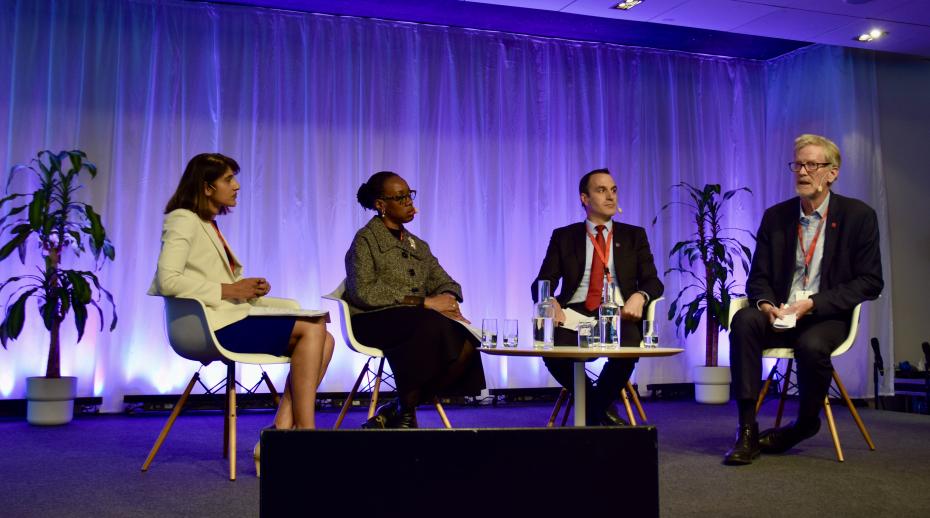
(Stockholm, 17 May 2023) Over the past three days, over 300 participants from 56 countries and over 40 partner organizations convened in person for the annual Stockholm Forum on Peace and Development. Watch Monday’s opening panel here and today’s closing panel here.
The topic at the centre of this year’s Forum was ‘Seeking Solutions for Turbulent Times’. In his welcoming address, Stefan Löfven, Chair of the SIPRI Governing Board, laid out the compounding and parallel challenges behind our turbulent times, and he opened the Forum as a safe space for exploring new ideas. ‘We will not stop at describing the problems. Our aim is to walk out of here with new, innovative solutions to address the complex, turbulent times we face,’ said Löfven.
Comfort Ero, President and CEO, Crisis Group, emphasized that the world is not facing one single challenge, so there will not be one single solution. ‘It is harder today because there is a real multiplicity of actors, and the world is more multipolar.’ Furthermore, Ero highlighted paying attention to regional geopolitics and cautioned against underestimating the geopolitics of the local. ‘If all the summits don’t begin to rethink who is at the table, I don’t think we are going to get to a solution.’
The panel ‘Fixing a Fractured World’, held on the second day, explored the transformational shifts needed to address today’s challenges. Drawing on her experiences from Afghanistan, Fatima Gailani, Afghan political leader and women’s rights activist, identified trust as the essential element. ‘If you don’t trust anyone who is coming and trying to fix something for you, it will not work,’ she said. Fellow panellist Elizabeth Spehar, United Nations Assistant Secretary-General for Peacebuilding Support, added political will, universality and solidarity to the list of key ingredients needed to fix a fractured world.
Under the themes of ‘getting things done’ and ‘how we connect’, the closing panel today agreed that the unifying principles of multilateral interaction are solidarity, joint ownership and respectful collaboration.
Ugochi Daniels, Deputy Director General for Operations, International Organization for Migration, emphasized the important role of the diaspora. She said there are huge challenges ahead but, with investment in social contract and social cohesion, we will have a fundamental basis for the reconstruction that needs to happen.
Deputy General Secretary for the g7+ Secretariat Habib Ur Rehman Mayar pointed out that multilateralism needs to become inclusive. ‘We need to be in the room where peacebuilding missions are designed,’ he said.
SIPRI Director Dan Smith concluded that layered problems require layered solutions. But, he also stressed that societies that cooperate are the ones that are successful; in the multifaceted security horizon we are facing, venues such as the Stockholm Forum offer a genuine meeting place for exchange and learning.
Rewatch the live streams here.
About SIPRI and the Stockholm Forum
The 2023 Stockholm Forum on Peace and Development enables interdisciplinary exchange among global thought leaders with the aim of influencing key policy and research agendas. It is hosted by SIPRI.
SIPRI is an independent international institute dedicated to research into conflict, armaments, arms control and disarmament. Established in 1966, SIPRI provides data, analysis and recommendations, based on open sources.
More information
For information and photo requests contact Stephanie Blenckner, SIPRI Communications Director (blenckner@sipri.org, +46 8 655 97 47), or Amelie Lutz, SIPRI Communications Officer (amelie.lutz@sipri.org, +46 766 286 133).
Follow @SIPRIorg on Twitter with #SthlmForum. Livestreams of the three plenary sessions are available on SIPRI’s YouTube channel.